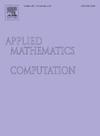Evolution of group behaviour in the ecological snowdrift game-level-headed and impatient delayed epidemic model under emergencies
IF 3.4
2区 数学
Q1 MATHEMATICS, APPLIED
引用次数: 0
Abstract
Major emergencies generate negative emotions within a group. Therefore, the topic of the spread of emotions leading to the coexistence of cooperation and defection within a group has attracted much attention. We introduced the influence of the external environment and constructed an ecological snowdrift game model to explore the evolution of cooperation and defection in this paper. On this basis, the ecological snowdrift game-level-headed and impatient delayed epidemic model was developed. This model considers the differences in individual personalities by categorizing individuals into level-headed and impatient groups, and also incorporates a delay in the spread of panic within groups. We computed a threshold value for panic spread and analysed the qualitative behaviour of the epidemic model, such as locally and globally asymptotically stable equilibria. The results indicated that cooperation is more likely to emerge in a group as the probability of a cooperator encountering an individual with the same strategy increases. Comparison with the level-headed and impatient delayed epidemic model revealed that group behaviour (i.e., cooperation and defection) can influence the evolutionary process of populations within a group. Numerical simulations verified the effectiveness of the derived results. The proposed model was analysed and validated through a practical example and visualization for sentiment analysis using the Naive Bayes algorithm. The findings of the paper can help to further explore the evolution of group behaviour.
突发事件下生态雪堆博弈-冷静-急躁延迟流行病模型的群体行为演化
重大突发事件会在团队中产生负面情绪。因此,情绪的传播导致群体内合作与背叛并存的话题备受关注。本文引入外部环境的影响,构建生态雪堆博弈模型,探讨合作与背叛的演化。在此基础上,建立了生态雪堆博弈、清醒、急躁延迟流行模型。该模型考虑了个体性格的差异,将个体分为头脑冷静和缺乏耐心的两类,并考虑了恐慌在群体内传播的延迟。我们计算了恐慌蔓延的阈值,并分析了流行病模型的定性行为,如局部和全局渐近稳定均衡。结果表明,当合作者遇到具有相同策略的个体的概率增加时,合作更有可能在群体中出现。通过与冷静和急躁的延迟流行病模型的比较,揭示了群体行为(即合作和背叛)可以影响群体内种群的进化过程。数值仿真验证了所得结果的有效性。利用朴素贝叶斯算法进行情感分析,并通过实例和可视化对该模型进行了分析和验证。这篇论文的发现有助于进一步探索群体行为的进化。
本文章由计算机程序翻译,如有差异,请以英文原文为准。
求助全文
约1分钟内获得全文
求助全文
来源期刊
CiteScore
7.90
自引率
10.00%
发文量
755
审稿时长
36 days
期刊介绍:
Applied Mathematics and Computation addresses work at the interface between applied mathematics, numerical computation, and applications of systems – oriented ideas to the physical, biological, social, and behavioral sciences, and emphasizes papers of a computational nature focusing on new algorithms, their analysis and numerical results.
In addition to presenting research papers, Applied Mathematics and Computation publishes review articles and single–topics issues.

 求助内容:
求助内容: 应助结果提醒方式:
应助结果提醒方式:


